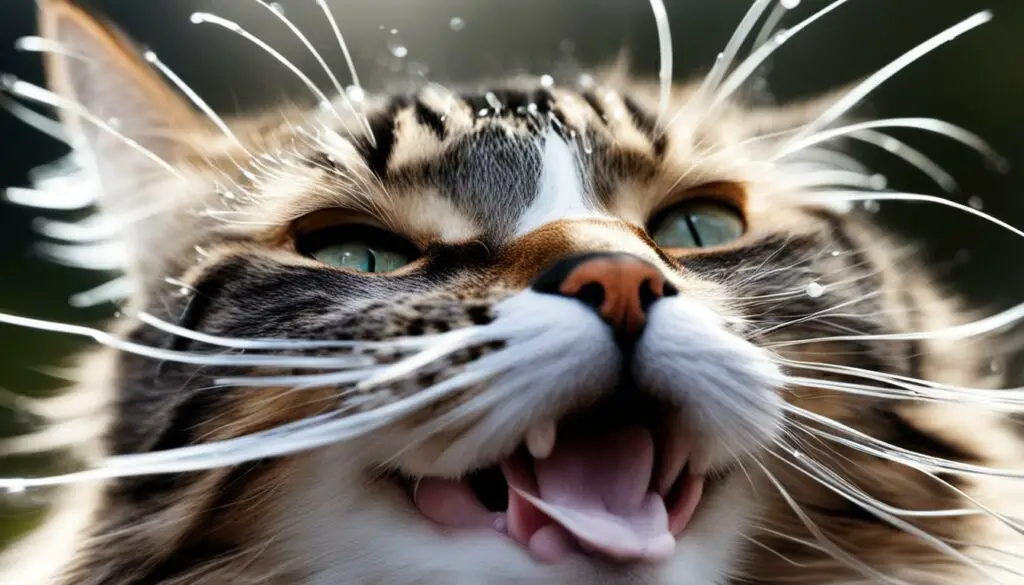As a cat owner, I know how concerning it can be when your furry friend starts sneezing. While cat sneezing is a common occurrence, it’s important to understand the underlying causes, potential remedies, and when it’s time to seek veterinary care. In this article, I will explore the various factors that can contribute to cat sneezing and provide you with the information you need to ensure the well-being of your beloved pet.
Cat sneezing can be caused by a range of issues, including viral and bacterial infections, allergies, and environmental triggers. Symptoms may include nasal discharge, coughing, wheezing, sinusitis, rhinitis, and congestion, as well as runny nose, itchy eyes, scratchy throat, watery eyes, and a stuffy nose. Common allergens such as pollen, dust mites, mold spores, and pet dander can also trigger sneezing in cats.
To ensure the health and well-being of your cat, it’s important to consult a veterinarian if your cat’s sneezing persists or is accompanied by other concerning symptoms. A vet can perform tests to identify the underlying cause, such as swab tests for viral or bacterial infections or allergy testing to determine specific triggers. Once a diagnosis is made, appropriate treatment options, such as antiviral medications, antibiotics, antihistamines, or corticosteroids, can be recommended.
In summary, understanding the causes and potential remedies for cat sneezing is crucial for maintaining your cat’s health. By monitoring symptoms, seeking veterinary care when necessary, and taking preventative measures, you can help manage cat sneezing and ensure your feline friend lives a happy and healthy life.
Key Takeaways:
- Cat sneezing can be caused by viral and bacterial infections, allergies, and environmental triggers.
- Symptoms of cat sneezing may include nasal discharge, coughing, wheezing, and congestion.
- Consult a veterinarian if your cat’s sneezing persists or is accompanied by concerning symptoms.
- Treatment options for cat sneezing can include antiviral medications, antibiotics, antihistamines, or corticosteroids.
- Preventative measures such as regular check-ups and minimizing exposure to irritants can help reduce cat sneezing.
Common Causes of Cat Sneezing
When your cat is experiencing sneezing episodes, it is essential to identify the underlying cause to provide appropriate treatment. Cat sneezing can be caused by various factors, including upper respiratory infections, viral infections such as feline herpes virus and feline calicivirus, and bacterial infections like feline infectious peritonitis, FIV, feline leukemia, chlamydia, bordetella, and mycoplasma. Inhaled irritants and allergens, such as cigarette smoke, perfumes, dust, pollen, and mold, can also trigger sneezing in cats.
To better understand the common causes of cat sneezing, let’s take a closer look:
| Cause | Description |
|---|---|
| Upper Respiratory Infections | These infections, including feline herpes virus and feline calicivirus, can cause sneezing, along with other symptoms like nasal discharge and coughing. |
| Bacterial Infections | Infections such as feline infectious peritonitis, FIV, feline leukemia, chlamydia, bordetella, and mycoplasma can result in sneezing episodes in cats. |
| Inhaled Irritants | Cigarette smoke, perfumes, dust, pollen, and mold are examples of inhaled irritants that can irritate a cat’s nasal passages and trigger sneezing. |
| Allergens | Environmental allergens like pollen, dust mites, mold spores, and pet dander can lead to allergic reactions in cats, including sneezing. |
Identifying the specific cause of your cat’s sneezing will help determine the appropriate treatment and provide relief for your feline friend.
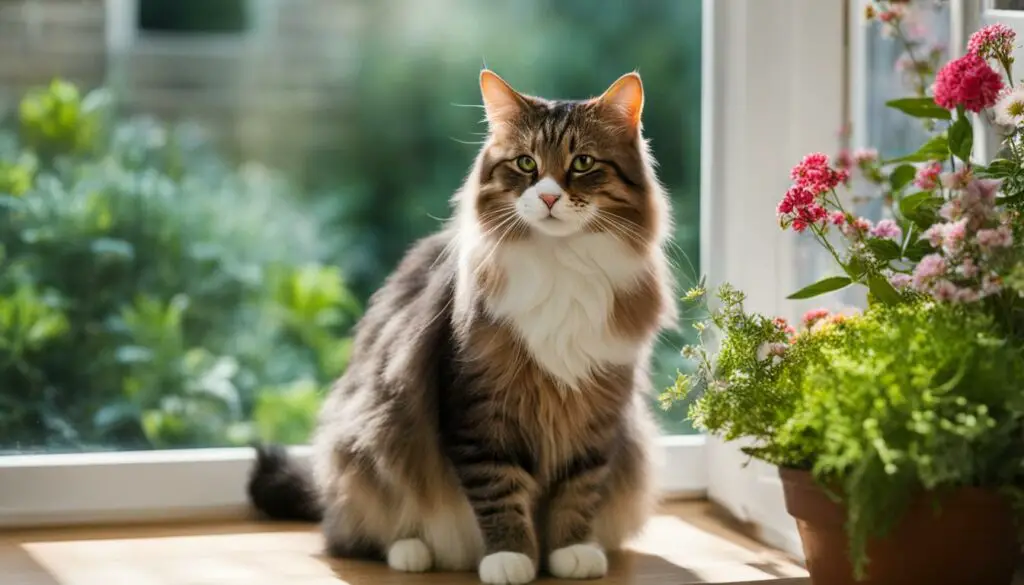
Sources:
Symptoms Associated with Cat Sneezing
When a cat starts sneezing, it’s important to pay attention to any accompanying symptoms. These symptoms can help determine the severity of the condition and whether veterinary care is necessary. Some common symptoms associated with cat sneezing include:
- Eye discharge: Cats may have watery or crusty discharge from their eyes.
- Nasal discharge: Along with sneezing, cats may have a runny nose with clear, yellow, or green discharge.
- Fatigue: Cats may exhibit signs of tiredness or decreased activity levels.
- Fever: A cat’s body temperature may be elevated.
- Coughing and wheezing: Cats may cough or make wheezing sounds.
- Poor coat condition: A cat’s fur may appear dull or unkempt.
- Trouble breathing: Cats may experience difficulty breathing or have rapid breathing.
- Decreased appetite: Cats may show a reduced interest in food or have a decreased appetite.
Monitoring these symptoms can provide valuable information to your veterinarian when seeking a diagnosis and determining the best course of treatment for your cat. If you notice any of these symptoms along with your cat’s sneezing, it is advisable to consult a veterinarian for further evaluation.
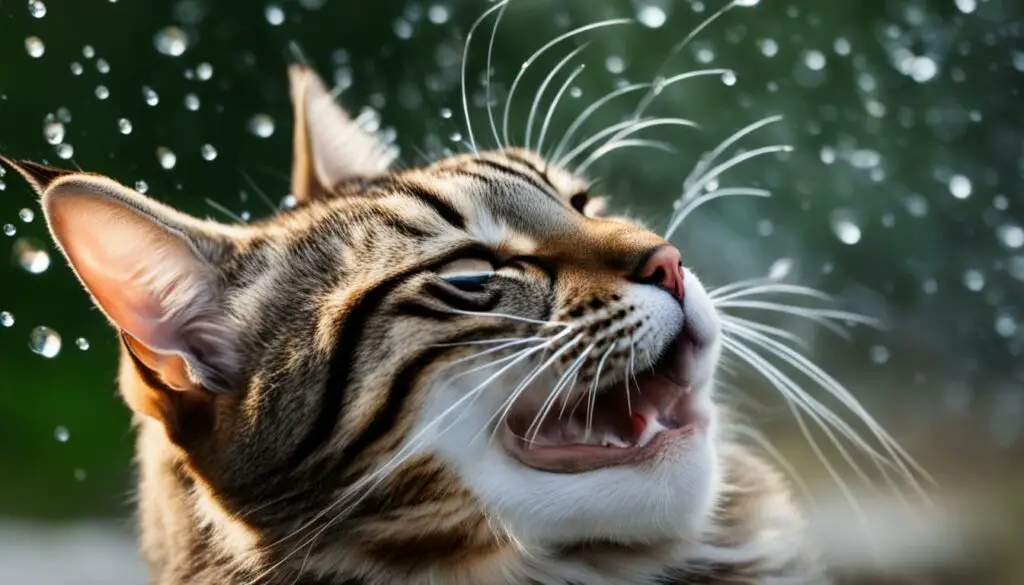
Quote:
“I noticed my cat was sneezing a lot and had yellowish discharge from her nose. She also seemed more tired than usual. I immediately took her to the vet, and they diagnosed her with a bacterial infection. With the right treatment, she made a full recovery.” – Cat owner
Table: Symptoms Associated with Cat Sneezing
| Symptom | Description |
|---|---|
| Eye discharge | Watery or crusty discharge from the eyes |
| Nasal discharge | Runny nose with clear, yellow, or green discharge |
| Fatigue | Tiredness or decreased activity levels |
| Fever | Elevated body temperature |
| Coughing and wheezing | Coughing or wheezing sounds |
| Poor coat condition | Dull or unkempt fur |
| Trouble breathing | Difficulty breathing or rapid breathing |
| Decreased appetite | Reduced interest in food or decreased appetite |
Remember, cats may exhibit varying combinations of these symptoms, and each cat’s situation is unique. Seeking veterinary care will help ensure an accurate diagnosis and appropriate treatment plan for your cat’s specific needs.
Diagnosing Cat Sneezing
If your cat’s sneezing persists or is accompanied by other concerning symptoms, it is advisable to consult a veterinarian. They will be able to conduct a thorough examination and perform tests to diagnose the underlying causes of the sneezing. One common diagnostic method is a swab test, which involves collecting samples from the cat’s nose or throat to check for viral or bacterial infections. By identifying the specific pathogen, the veterinarian can prescribe the appropriate medications or treatments to address the infection.
In some cases, if allergies or inhaled irritants are suspected, allergy testing may be recommended. This testing involves exposing the cat to different allergens to identify the specific triggers. Once the triggers are identified, the veterinarian can work with you to develop a plan to minimize exposure and manage the allergies effectively.
It is important to seek veterinary consultation for proper diagnosis as self-diagnosis and treatment without professional expertise may lead to ineffective or potentially harmful outcomes. Veterinarians have the knowledge and experience to accurately diagnose and treat cat sneezing, ensuring the best possible care for your feline friend.
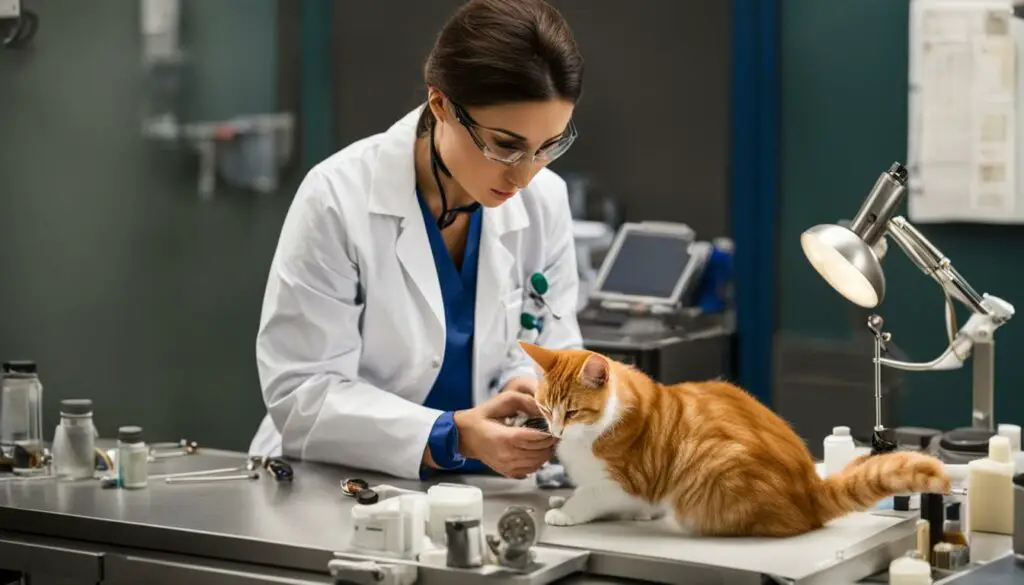
Table: Common Diagnostic Methods for Cat Sneezing
| Diagnostic Method | Description |
|---|---|
| Swab Test | A sample is taken from the cat’s nose or throat to check for viral or bacterial infections. |
| Allergy Testing | The cat is exposed to different allergens to identify specific triggers. |
Treatment Options for Cat Sneezing
When it comes to treating cat sneezing, the approach will depend on the underlying cause. Here are some common treatment options that veterinarians may recommend:
- Antiviral Medications: If the sneezing is caused by a viral infection, such as feline herpes virus or feline calicivirus, antiviral medications may be prescribed. These medications can help manage the symptoms and reduce the duration of the infection.
- Antibiotics: In cases where a bacterial infection is the culprit, antibiotics may be necessary to eliminate the infection. It’s important to follow the prescribed dosage and complete the full course of antibiotics to ensure the infection is completely eradicated.
- Antihistamines: When allergies are the cause of sneezing, antihistamines can help reduce the allergic response and alleviate symptoms. However, it’s important to consult with a veterinarian before giving any medication to your cat, as some human antihistamines can be toxic to cats.
- Decongestants and Nasal Sprays: Decongestants and nasal sprays can help relieve nasal congestion and make breathing easier for cats experiencing sneezing. These medications should be used under veterinary guidance to ensure proper dosage and safety.
- Corticosteroids: Corticosteroids may be prescribed to reduce inflammation in the nasal passages and alleviate sneezing. These medications are usually given in the form of injections or oral tablets, and their use should be closely monitored by a veterinarian.
- Home Remedies: In some cases, home remedies may provide relief for cat sneezing. Steam inhalation, saline nasal drops, or using a humidifier can help moisturize the nasal passages and reduce irritation. However, it’s important to consult with a veterinarian before trying any home remedies to ensure they are safe and suitable for your cat.
It’s crucial to follow the veterinarian’s recommendations for treatment and monitor your cat’s response. If the sneezing persists or worsens, or if your cat develops additional concerning symptoms, it’s important to seek veterinary care for further evaluation and guidance.
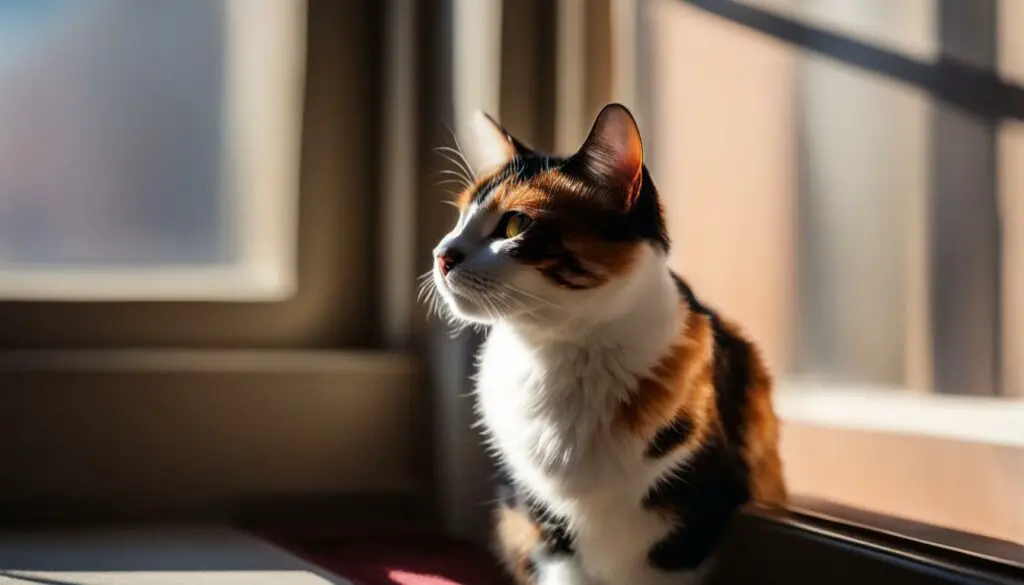
Viral Infections and Cat Sneezing
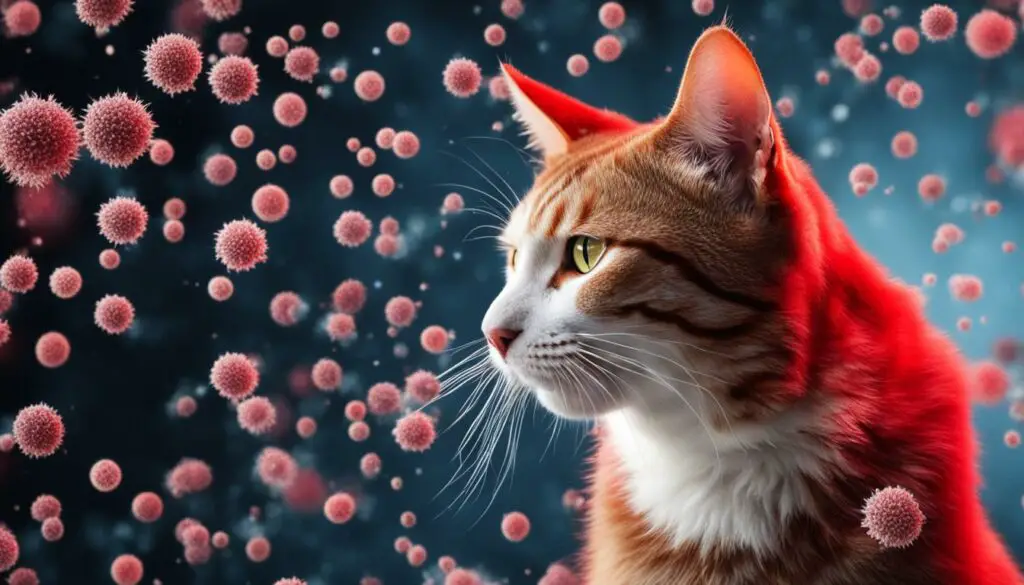
Feline viral infections, such as feline herpes virus and feline calicivirus, are common causes of cat sneezing. These infections can be transmitted from infected cats through direct contact or shared items. Symptoms may include sneezing, eye discharge, nasal discharge, and fever. Treatment aims to manage symptoms and prevent secondary complications. It is important to follow the veterinarian’s advice for the appropriate treatment.
Viral infections in cats can be highly contagious and often result in upper respiratory symptoms, including sneezing. The feline herpes virus, also known as feline viral rhinotracheitis, is one of the most common causes of viral respiratory infections in cats. It is highly contagious and can be spread through direct contact with infected cats, as well as through shared bedding, litter boxes, or food dishes.
Feline calicivirus is another common viral infection that can cause sneezing in cats. It can also lead to oral ulcerations, swollen joints, and fever. Just like feline herpes virus, feline calicivirus can be transmitted through direct contact with infected cats or through contaminated objects.
Treatment for viral infections in cats focuses on managing symptoms and supporting the immune system. This may include antiviral medications, supportive care such as fluid therapy, and maintaining a stress-free environment to help the cat recover. It is important to consult with a veterinarian to determine the appropriate treatment plan for your cat.
Bacterial Infections and Cat Sneezing
When it comes to cat sneezing, bacterial infections can play a significant role, especially as secondary complications resulting from viral infections. Upper respiratory bacterial infections, if left untreated, can exacerbate sneezing in cats and lead to more severe symptoms. It is essential to understand the causes, symptoms, and treatment options to ensure your furry friend’s well-being.
Bacterial infections in cats can occur as a result of a weakened immune system or exposure to infected cats. These infections can cause inflammation in the upper respiratory tract, leading to sneezing and other respiratory symptoms. Common bacteria that may contribute to cat sneezing include Bordetella, Chlamydia, and Mycoplasma.
Treatment for bacterial infections typically involves the use of antibiotics to eliminate the infection and reduce inflammation. It is crucial to follow your veterinarian’s instructions regarding the dosage and duration of antibiotic treatment. Completing the full course of antibiotics is necessary to ensure complete recovery and prevent the development of antibiotic-resistant bacteria.
Table: Common Antibiotics Used to Treat Bacterial Infections in Cats
| Antibiotic Name | Common Trade Names | Administration |
|---|---|---|
| Amoxicillin | Amoxi-Tabs, Trimox, Biomox | Oral |
| Clindamycin | Antirobe, Cleocin | Oral or injectable |
| Enrofloxacin | Baytril | Oral or injectable |
In addition to antibiotic treatment, supportive care may be necessary to alleviate symptoms and aid in the recovery process. This may include providing a comfortable and stress-free environment for your cat, ensuring proper hydration and nutrition, and monitoring for any changes in symptoms or behavior.
If your cat’s sneezing persists or worsens despite antibiotic treatment, it is essential to consult with your veterinarian. They may recommend further diagnostic tests or adjustments to the treatment plan to address any underlying issues or complications.
Allergies and Cat Sneezing
Feline allergies can contribute to cat sneezing, although they are less common in cats compared to humans. Environmental triggers such as pollen, dust mites, mold spores, and pet dander can cause allergic reactions in cats. Common symptoms of feline allergies include sneezing, itchy eyes, scratchy throat, and nasal congestion. If you notice these symptoms in your cat, it is recommended to consult with a veterinarian for proper diagnosis and treatment.
Treatment options for feline allergies may include antihistamines, corticosteroids, and minimizing exposure to the allergens causing the reaction. Antihistamines can help reduce the allergic response, while corticosteroids can help alleviate inflammation and itching. Minimizing exposure to allergens such as pollen, dust mites, and mold spores can also help manage allergic reactions in cats.
Consultation with a veterinarian is crucial for proper diagnosis and treatment of feline allergies. Your veterinarian may recommend allergy testing to identify specific triggers and develop an effective treatment plan. They may also provide guidance on how to manage your cat’s environment to minimize exposure to allergens. With proper care and treatment, you can help alleviate your cat’s sneezing and improve their overall comfort and well-being.
Symptoms of Cat Allergies
- Sneezing
- Itchy eyes
- Scratchy throat
- Nasal congestion
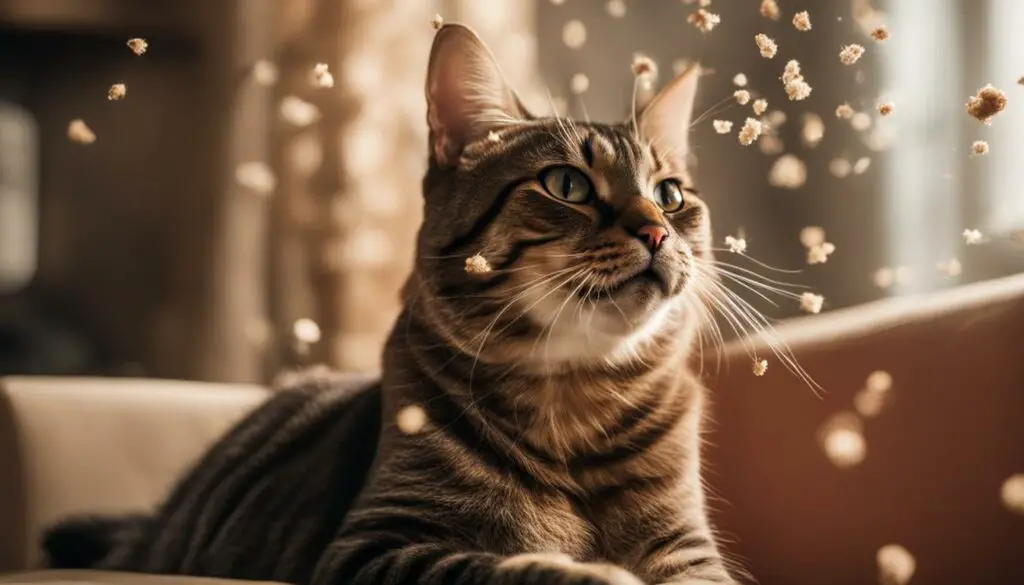
In conclusion, feline allergies can be a cause of cat sneezing. Environmental triggers such as pollen, dust mites, mold spores, and pet dander can lead to allergic reactions in cats. Monitoring your cat for symptoms and consulting with a veterinarian for proper diagnosis and treatment is essential. By managing allergies and minimizing exposure to allergens, you can help alleviate your cat’s sneezing and improve their overall quality of life.
Inhaled Irritants and Cat Sneezing
When it comes to cat sneezing, inhaled irritants can play a significant role. Cats have a sensitive respiratory system, and exposure to certain substances can trigger bouts of sneezing. Common inhaled irritants include cigarette smoke, perfumes, cleaning agents, dust, and candles. These irritants can irritate a cat’s nasal passages, leading to sneezing episodes.
“Cigarette smoke, perfumes, cleaning agents, dust, and candles can all contribute to a cat’s sneezing.”
To prevent cat sneezing caused by inhaled irritants, it is crucial to minimize exposure to these substances. Avoid smoking around your cat and opt for unscented cleaning agents and candles. Keep your home clean and free from dust by dusting and vacuuming regularly. Additionally, provide proper ventilation in your living space to reduce the concentration of irritants in the air.
“Minimizing exposure to inhaled irritants can help prevent cat sneezing and promote a healthier environment for your feline companion.”
Creating a clean and irritant-free environment can help reduce the frequency of cat sneezing episodes caused by inhaled irritants. By taking proactive measures to prevent exposure to cigarette smoke, perfumes, cleaning agents, dust, and candles, you can promote a healthier and sneeze-free environment for your beloved cat.
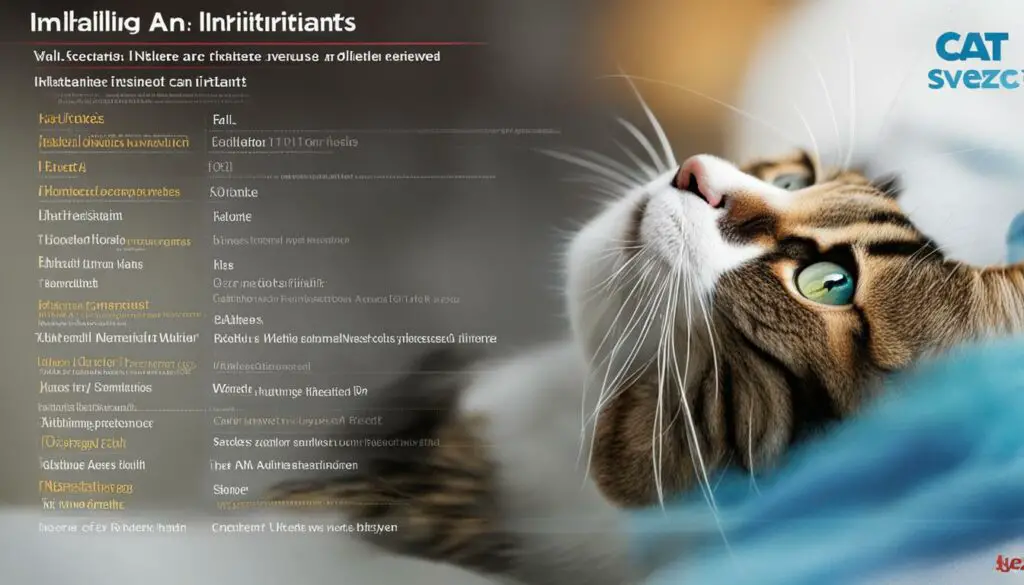
Sources:
- “Cat Allergies: Symptoms, Causes, and Treatments.” WebMD, WebMD, 9 Feb. 2021, www.webmd.com/allergies/cat-allergies#1.
- “Upper Respiratory Infection in Cats.” VCA Hospitals, www.vcahospitals.com/know-your-pet/upper-respiratory-infection-in-cats.
- “Common RTO Irritants.” American Lung Association, www.lung.org/our-initiatives/healthy-air/indoor/indoor-air-pollutants/raging-toxic-irritants.
Inflammatory Conditions and Other Factors Contributing to Cat Sneezing
Aside from viral infections, bacterial infections, allergies, and inhaled irritants, there are other factors that can contribute to cat sneezing. These include inflammatory conditions such as rhinitis and sinusitis, as well as tooth root infections, foreign bodies, tumors, and chronic respiratory conditions. Identifying these underlying factors is important for effective treatment and management of cat sneezing.
One possible cause of cat sneezing is rhinitis, which is the inflammation of the nasal mucous membranes. Rhinitis can be caused by various factors, including infections, allergies, irritants, and immune-mediated diseases. Common symptoms of rhinitis include sneezing, nasal discharge, nasal congestion, and nasal congestion. Treatment options for rhinitis will depend on the underlying cause.
In some cases, tooth root infections can lead to sneezing in cats. These infections occur when the tooth root becomes infected with bacteria, leading to inflammation and discomfort. Foreign bodies, such as grass or small objects, can also irritate the nasal passages and cause sneezing. Tumors in the nasal passages can also contribute to sneezing, especially if they obstruct the airway or cause inflammation.
Chronic respiratory conditions, such as chronic rhinitis, can result in recurring sneezing episodes. These conditions may be caused by long-term exposure to irritants, underlying infections, or immune system abnormalities. Proper diagnosis and management of these chronic conditions are essential to reduce sneezing episodes and improve the cat’s quality of life.
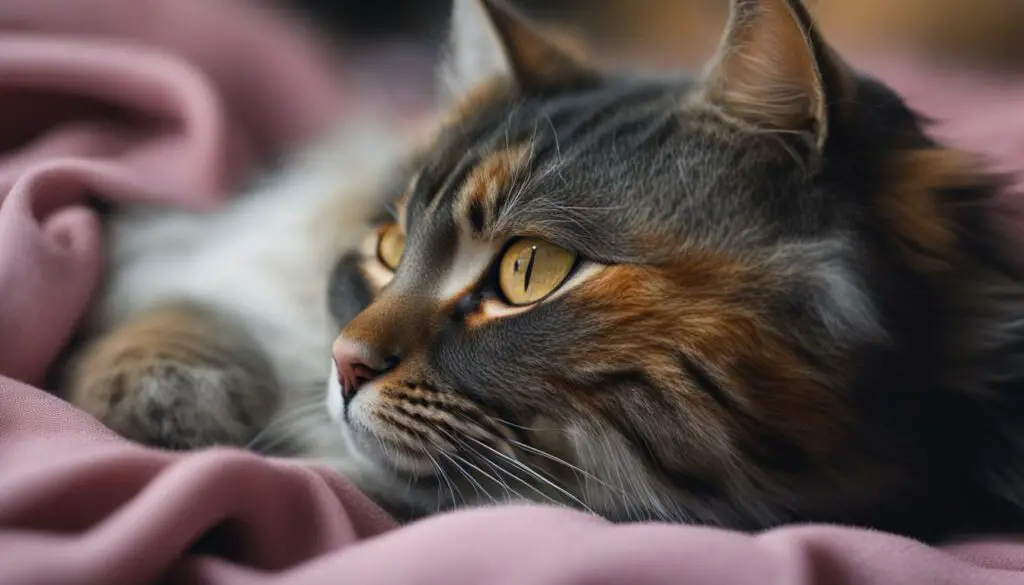
Table: Causes of Cat Sneezing due to Inflammatory Conditions and Other Factors
| Cause | Description |
|---|---|
| Rhinitis | Inflammation of the nasal mucous membranes, leading to sneezing, nasal discharge, and congestion. |
| Tooth root infections | Infections in the tooth root that can spread to the nasal passages, causing sneezing and discomfort. |
| Foreign bodies | Small objects or grass can irritate the nasal passages and trigger sneezing. |
| Tumors | Growth in the nasal passages that can obstruct the airway and cause sneezing. |
| Chronic respiratory conditions | Long-term conditions like chronic rhinitis that result in recurring sneezing episodes. |
When to Seek Veterinary Care for Cat Sneezing
If your cat is experiencing continuous sneezing or if you notice blood in their sneezes, it is important to seek veterinary care. These symptoms can indicate a more serious underlying condition that requires immediate attention. Additionally, if your cat is displaying severe symptoms such as excessive nasal discharge, coughing, wheezing, or trouble breathing, it is crucial to consult with a veterinarian as soon as possible.
Continuous sneezing could be a sign of a persistent infection or an allergic reaction that needs to be addressed. Sneezing blood, known as epistaxis, could indicate a nasal injury or a more serious condition such as a tumor. It is essential to have your cat examined by a veterinarian to determine the cause and appropriate treatment options.
Veterinary consultation is necessary to ensure the well-being of your cat and to receive proper diagnosis and treatment. A veterinarian will conduct a thorough examination, which may include diagnostic tests such as swab tests, allergy testing, or imaging studies, to identify the underlying cause of the sneezing and provide appropriate medical intervention.
Summary:
- Continuous sneezing, sneezing blood, or severe symptoms require veterinary consultation.
- These symptoms may indicate a more serious underlying condition that needs immediate attention.
- Seeking veterinary care is crucial to determine the cause of the sneezing and provide appropriate treatment.
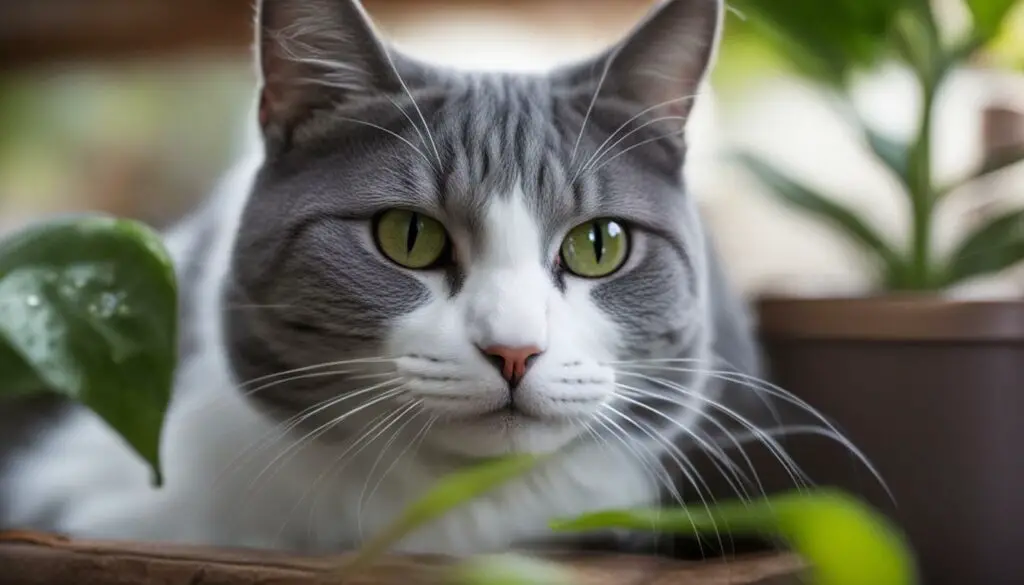
Tips for Preventing Cat Sneezing
Preventing cat sneezing is essential for maintaining your cat’s health and well-being. By taking a proactive approach and implementing these tips, you can minimize the occurrence of sneezing episodes and provide a safe and comfortable environment for your furry friend.
1. Vaccinations
Ensure that your cat is up to date on vaccinations, particularly for viral infections such as feline herpes virus and feline calicivirus. Regular vaccinations can help protect your cat from these common causes of cat sneezing.
2. Maintain a Clean Indoor Environment
Keep your cat’s living space clean and free from irritants and allergens. Regularly dust and vacuum, and avoid using strong-smelling cleaning agents or candles that may irritate their nasal passages.
3. Practice Good Cleanliness
Wash your hands before and after handling your cat, especially if you have been around other cats or animals. This can help prevent the spread of infections and minimize the risk of cat sneezing.
4. Regular Veterinary Check-ups
Schedule regular check-ups with your veterinarian to monitor your cat’s overall health. Regular visits allow for early detection and treatment of any potential underlying issues that may contribute to cat sneezing.
By following these preventative measures, you can reduce the frequency of cat sneezing and create a safe and comfortable environment for your beloved feline companion.
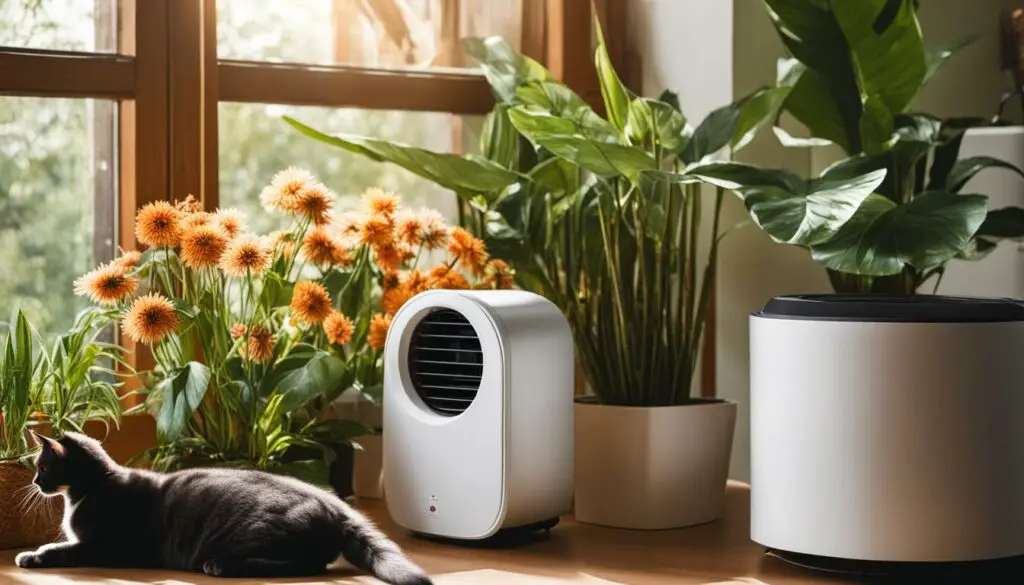
Conclusion
In conclusion, cat sneezing is a common occurrence and is usually not a cause for concern. However, it is important to understand the underlying causes, remedies, and when to seek veterinary care. Sneezing in cats can be caused by viral and bacterial infections, allergies, and environmental triggers.
Identifying the specific cause of cat sneezing is crucial for providing appropriate treatment and ensuring the well-being of your furry friend. Viral infections such as feline herpes virus and feline calicivirus, as well as bacterial infections, may require antiviral medications or antibiotics. Allergies can be managed with antihistamines, decongestants, and corticosteroids. Inhaled irritants and environmental triggers should be minimized to reduce sneezing episodes.
It is important to monitor any accompanying symptoms such as nasal or eye discharge, coughing, wheezing, or decreased appetite. If your cat’s sneezing persists or is accompanied by severe symptoms, it is advisable to consult a veterinarian. They can perform diagnostic tests, prescribe appropriate medications, and provide guidance on preventive measures.
By understanding the causes and symptoms of cat sneezing, seeking veterinary care when necessary, and implementing preventive measures, you can help manage sneezing episodes and ensure the overall well-being of your beloved feline companion.
FAQ
Is cat sneezing a cause for concern?
Cat sneezing is a common occurrence and usually not a cause for concern. However, if the sneezing persists or is accompanied by other concerning symptoms, it is advisable to consult a veterinarian.
What are the common causes of cat sneezing?
Cat sneezing can be caused by viral and bacterial infections, allergies, and inhaled irritants such as smoke and dust.
What are the symptoms associated with cat sneezing?
Symptoms of cat sneezing may include eye discharge, nasal discharge, fatigue, fever, coughing, wheezing, poor coat condition, trouble breathing, and decreased appetite.
How is cat sneezing diagnosed?
Veterinary consultation may be necessary for diagnosis. Swab tests can identify viral or bacterial infections, and allergy testing may be recommended for suspected allergies.
What are the treatment options for cat sneezing?
Treatment options for cat sneezing depend on the underlying cause and may include antiviral medications, antibiotics, antihistamines, decongestants, nasal sprays, corticosteroids, and home remedies.
What are viral infections that cause cat sneezing?
Viral infections such as feline herpes virus and feline calicivirus are common causes of cat sneezing. These infections can be transmitted from infected cats through direct contact or shared items.
How are bacterial infections related to cat sneezing treated?
Bacterial infections, especially secondary complications from viral infections, may require treatment with antibiotics. It is important to complete the full course of antibiotics as prescribed by the veterinarian.
What are the common allergens that trigger cat sneezing?
Common allergens that may trigger cat sneezing include pollen, dust mites, mold spores, and pet dander. Minimizing exposure to these allergens and consulting with a veterinarian for proper diagnosis and treatment can help manage allergies.
What are the inhaled irritants that can cause cat sneezing?
Inhaled irritants such as cigarette smoke, perfumes, cleaning agents, dust, and candles can irritate a cat’s nasal passages, leading to sneezing. Identifying and avoiding these irritants can help reduce sneezing episodes.
What other factors can contribute to cat sneezing?
Inflammatory conditions like rhinitis and sinusitis, tooth root infections, inhaled foreign bodies, tumors in the nasal passages, and chronic respiratory conditions can also contribute to cat sneezing. Proper diagnosis and treatment by a veterinarian are necessary to address these underlying factors.
When should I seek veterinary care for cat sneezing?
If your cat’s sneezing continues or is accompanied by severe symptoms like continuous sneezing, sneezing blood, excessive nasal discharge, coughing, wheezing, or trouble breathing, it is important to seek immediate veterinary attention.
How can I prevent cat sneezing?
Taking preventative measures such as ensuring your cat is up to date on vaccinations, maintaining a clean indoor environment, minimizing exposure to irritants and allergens, and regular veterinary check-ups can help reduce the occurrence of cat sneezing.
Source Links
- https://bluepearlvet.com/medical-articles-for-pet-owners/cat-sneezing-does-your-cat-have-a-cold/
- https://www.webmd.com/pets/cats/why-cats-sneeze
- https://www.purina.co.uk/articles/cats/health/symptoms/cat-sneezing

